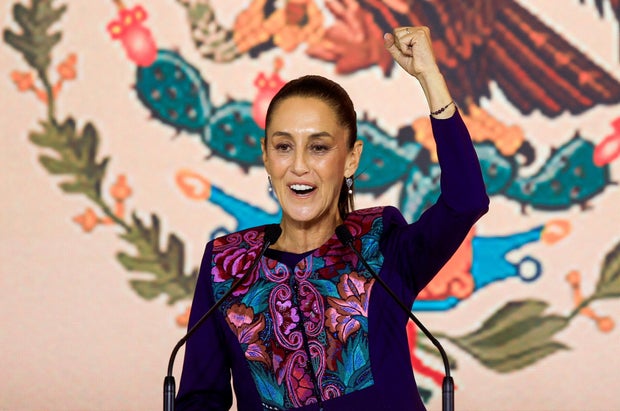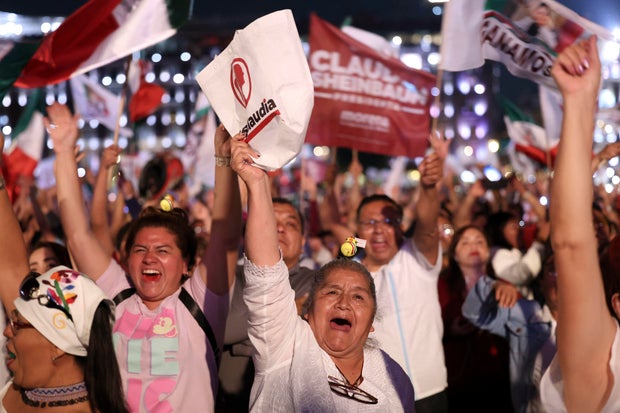Mexico’s projected presidential winner, Claudia Sheinbaum, will become the first female president in the country’s 200-year history.
The climatologist and former mayor of Mexico City said Sunday night that her two competitors called her and acknowledged her victory.
“I will become the first female president of Mexico,” Sheinbaum said with a smile, speaking at a downtown hotel shortly after election authorities announced that a statistical sample showed she had an irreversible lead. “I can’t do it alone. We all can do it, with our heroines who gave us our homeland, with our mothers, our daughters and our granddaughters.”
“We demonstrated that Mexico is a democratic country with peaceful elections,” she said.
Raquel Cunha/REUTERS
The president of the National Electoral Institute said that Sheinbaum had between 58.3% and 60.7% of the votes, according to a statistical sample. Opposition candidate Xóchitl Gálvez had between 26.6% and 28.6% of the vote and Jorge Álvarez Máynez had between 9.9% and 10.8% of the vote.
The preliminary count, which started very slowly, put Sheinbaum 27 points ahead of Gálvez, with 42% of polling place counts counted shortly after his victory speech.
The government party candidate campaigned to continue the political course set over the last six years by her political mentor, President Andrés Manuel López Obrador.
His successor, 61-year-old Sheinbaum, led the campaign despite a vigorous challenge from Gálvez. This was the first time in Mexico that the two main opponents were women.
“Of course, I congratulate Claudia Sheinbaum with all my respect, who ended up winning by a wide margin,” López Obrador said shortly after the electoral authorities’ announcement. “She will be the first (female) president of Mexico in 200 years.”
If the margin holds, it would come close to his landslide victory in 2018. López Obrador won the presidency after two unsuccessful attempts with 53.2% of the vote, in a three-way contest where National Action obtained 22.3% and the Institutional Revolutionary Party obtained 16.5%.
SILVANA FLORES/AFP via Getty Images
Previously, Gálvez wrote on social platform X: “The votes are there. Don’t let them hide them.”
Sheinbaum is unlikely to enjoy the kind of unquestioning devotion that López Obrador has enjoyed. Both belong to the ruling Morena party.
In Mexico City’s colonial-era main square, the Zócalo, Sheinbaum’s leadership did not initially draw the kind of enthusiastic, jubilant crowds that greeted López Obrador’s 2018 victory.
Fernando Fernández, a 28-year-old chef, joined the relatively small crowd, hoping for a Sheinbaum win, but even he acknowledged there were problems.
“You vote for Claudia out of conviction, for AMLO,” said Fernández, referring to López Obrador by his initials, as do most Mexicans. But his biggest hope is that Sheinbaum can “improve what AMLO was unable to do, the price of gasoline, crime and drug trafficking, which he did not combat despite having the power.”
Also in the crowd, Itxel Robledo, 28, a business administrator, expressed hope that Sheinbaum would do what López Obrador did not. “What Claudia has to do is place professionals in all areas.”
Elsewhere in the city, Yoselin Ramírez, 29, said she voted for Sheinbaum but split her vote among other positions because she didn’t want anyone to have a strong majority.
“I don’t want everything to be occupied by the same party, so there can be a little more equality,” she said without giving further details.
The main opposition candidate, Gálvez, a technology entrepreneur and former senator, tried to capitalize on Mexicans’ security concerns and promised to take a more aggressive approach to organized crime.
Almost 100 million people were registered to vote, but participation appeared to be slightly lower than in previous elections. Voters also elected governors in nine of the country’s 32 states and chose candidates for both chambers of Congress, thousands of mayors and other local offices, in the biggest elections the country has ever seen and which were marked by violence.
The elections were widely seen as a referendum on López Obrador, a populist who expanded social programs but failed to reduce cartel violence in Mexico. His Morena party currently holds 23 of the 32 governments and a simple majority of seats in both houses of Congress. Mexico’s constitution prohibits the re-election of the president.
Sheinbaum promised to continue all of López Obrador’s policies, including a universal pension for the elderly and a program that pays young people to be apprentices.
Gálvez, whose father was indigenous Otomi, went from selling snacks on the streets of his poor hometown to starting his own technology companies. A candidate running with a coalition of major opposition parties, she left the Senate last year to focus her ire on López Obrador’s decision to avoid confronting drug cartels through his “hugs, not bullets” policy. She promised to pursue criminals more aggressively.
Persistent cartel violence and Mexico’s middling economic performance were the main issues on voters’ minds.
Mexico City office worker Julio García said he was voting for the opposition in Mexico City’s central San Rafael neighborhood. “They robbed me twice at gunpoint. We need to change direction, change leadership,” said the 34-year-old. “Continuing in the same way, we will become Venezuela.”
On the outskirts of Mexico City, in the San Andres Totoltepec neighborhood, election officials walked past Stephania Navarrete, a 34-year-old housewife, who watched dozens of cameramen and election officials gather where front-runner Claudia Sheinbaum was scheduled to vote.
Navarrete said he planned to vote for Sheinbaum despite his own doubts about López Obrador and his party.
“Having a female president, for me, as a Mexican woman, it will be like before, when just because you say you are a woman, you are limited to certain professions.
She said Sheinbaum’s mentor’s social programs were crucial, but added that the deterioration of cartel violence in recent years was her main concern in this election.
“This is something they need to focus more on,” she said. “For me, security is the big challenge. They said they were going to reduce crime levels, but no, it was the opposite, they shot up. Obviously, I don’t blame the president completely, but it is, in a way, his responsibility.”
In Iztapalapa, Mexico City’s largest neighborhood, Angelina Jiménez, a 76-year-old housewife, said she came to vote “to put an end to this inept government that says we are fine and (still) there are so many dead.”
She said the violence plaguing Mexico really worried her, so she planned to vote for Gálvez and his promise to stand up to the cartels. López Obrador “says we are better and that is not true. We are worse.”
López Obrador claims to have reduced historically high levels of homicides by 20% since taking office in December 2018. But this is largely a claim based on a questionable reading of the statistics. The actual homicide rate appears to have decreased by only about 4% in six years.
Just as the upcoming rematch between US President Joe Biden and former President Donald Trump in November highlighted deep divisions in the US, Sunday’s election revealed how severely polarized public opinion in Mexico is over the country’s direction. , including your security strategy and how to grow. the economy.
In addition to the fight for control of Congress, the race for mayor of Mexico City – a position now considered equivalent to a government – is also important. Sheinbaum is just the latest of many Mexico City mayors, including López Obrador, who has run for president. Governors in large, populous states like Veracruz and Jalisco are also attracting interest.
bol co
jogo de terror online
novela sbt ao vivo
wishlist
musica terra seca
taça png
























